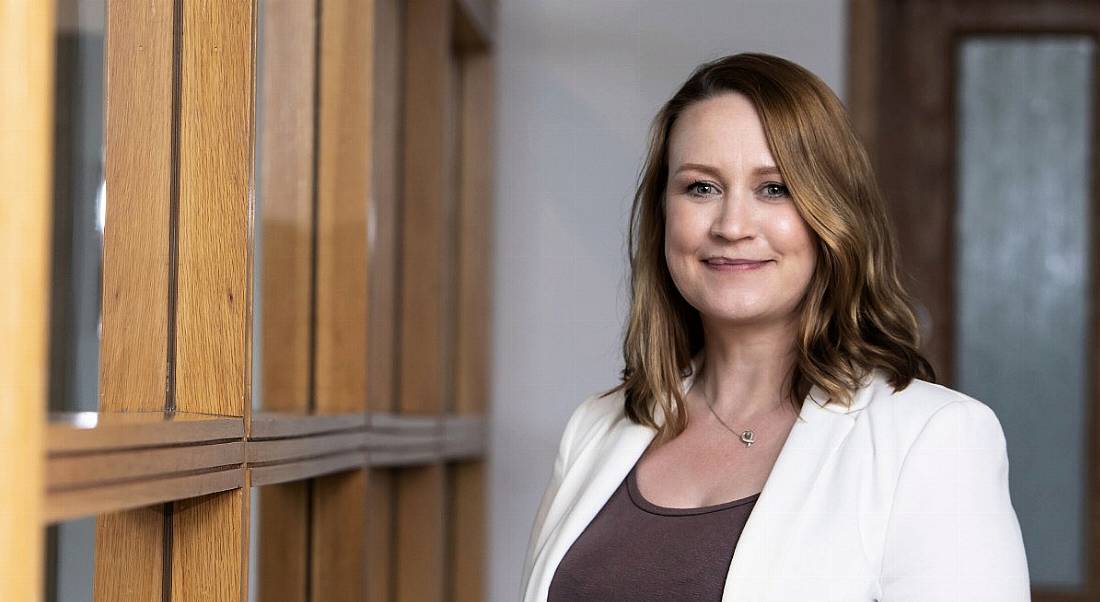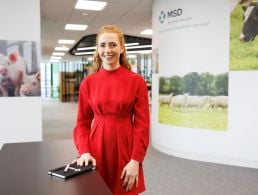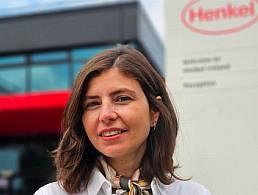Director of automation at MSD, Lisa McEvoy, discusses how she’s transforming her team from ‘data hunter-gatherers’ into ‘knowledge workers’.
What happens at the intersection between automation, digital innovation and patient-focused biotechnology? As the director of automation and IT at pharma giant MSD, Lisa McEvoy is in the perfect position to help us find out.
She spoke to Siliconrepublic.com about the work her team is carrying out and her own experiences in the field of research.
‘People, more than anything else, are what makes any project successful and developing solid working relationships is critical to any success’
– LISA MCEVOY
What experiences led you to your role in MSD?
I’m not an engineer by education, which is a little unusual in this field. I did an arts degree in European studies in the University of Limerick (UL), would you believe? This was in the early 90s, so IT at that time meant massive rooms filled with car-sized servers and no real internet to speak of. In my final year, I used a Mac for the first time and was instantly hooked. So as soon as I finished my degree, I completed a postgrad in IT.
From there, I held a number of roles in IT such as a software tester for Microsoft and an office designer for EDS, and I got to live in Holland for three years. It was with EDS that I got my first taste of automation on a project for a Dutch chemical company, DSM.
When I returned to Ireland in 2003, I took my first automation role as an automation engineer with the Coca-Cola Company in the west of Ireland, and found my true passion! I had the opportunity to grow and develop there, as well as travel the world, including assignments in Chile, Argentina, Brazil, Costa Rica and China.
Towards the end of my time in Coca-Cola, I developed an interest in project management and returned to UL to complete my master’s in project management in 2013. In late 2015, I was looking for a new challenge and decided to change industry completely and joined MSD, spearheading the EMEA project delivery team in the digital manufacturing space.
At the beginning of 2017, I was given the opportunity to join the MSD Biotech Dublin project, a once in a lifetime project, so I jumped at the chance and I haven’t looked back since. Five short months later, I became the director of automation and IT at the site.
Can you tell us about what you’re currently working on?
My passion is to turn our people from ‘data hunter-gatherers’ into ‘knowledge workers’. We can spend up to 20pc of our time simply looking for information. The amount of time that is wasted every day simply looking for information is time that the incredibly smart people I work with aren’t spending on real, valuable work for our patients at MSD.
My team are working with our internal customers to develop new ways of gathering data and making it available in real time in a variety of formats to best suit each person or team, using technology and digital platforms to drive the business forward. Rather than reacting to a sample from the lab, wouldn’t it be fantastic to be able to monitor our data in real time and, either through machine learning or people learning, use that information to course-correct?
There is also a huge opportunity in our data to remove waste from our processes and improve our overall efficiency, productivity and, ultimately, our quality of service and care for our patients. If you can’t measure it, you can’t improve it.
One of the most exciting pieces of technology we are currently working with is in our self-titled ‘Idea Centre’. This will be our digital brain of the facility. The hardware we are using is straight out of Hollywood and was actually invented by the same person who created the concept for the Tom Cruise movie Minority Report!
What first stirred your interest in this area?
It sounds like a cliché, but having come from a highly automated industry, I found it challenging at first to operate in a world where there is so much paper. Our personal lives are so digitised, and we have become so adept at using technology to improve our everyday lives, why wouldn’t we look for the same opportunities in our professional lives?
Imagine if I asked you to swap the new iPhone for some stationery and a pen – you wouldn’t, right? But that is what our industry was asking people to do for the last several years, and it’s incredibly exciting to be able to change that and to have our teams embrace that change.
If there is such a thing, can you describe a typical day for you?
Right now, in the midst of a massive capital project, there really isn’t a typical day. The fast pace means that every day – every hour – is different. Each day there are new problems to be solved and new discoveries to be made.
On any given day I could be working with a vendor to get equipment delivered on time, arranging logistics for our team who are testing equipment on another continent, or piloting a new piece of technology that has only just been released but isn’t yet used in manufacturing.
What skills and tools do you use on a daily basis?
Apart from the technical skills needed for the job, the main skillset is dealing with people and communications. People, more than anything else, are what makes any project successful and developing solid working relationships is critical to any success.
Moreover, being able to articulate technical design, problems and decisions in simple terms is really important to ensure key stakeholders from other parts of the business remain informed and can support as needed.
What applications do you foresee for this research?
There really is no limit. The work we are doing in the area of data analytics, data visualisation and rethinking our ways of working has applications far beyond the biotech industry.
That being said, to be able to apply this work in the area of immuno-oncology is the best job satisfaction anyone could ask for.
Are there any common misconceptions about this area ?
There are two: the first is that this is a ‘man’s world’, and the second is that this type of work is only open to engineers. I’m living proof that neither is true. Some of the roles in my team at MSD today didn’t exist even five years ago, and the college courses still don’t exist today.
So, for anyone starting out in their career, I would say keep an open mind. The path you start on will have many different turns and crossroads, don’t be afraid of the unknown!
When you first started this role, what were you most surprised to learn?
Most surprising, perhaps, is that while being technically strong is important to a field like this, being ‘people strong’ is even more so. You can find all the latest digital toys there are, but if there isn’t a real business need and the communication skills to sell it in, then that digital toy will fail.
Culture is even more important in this area and developing a thirst in the business users for how technology can improve how they work is the only way to succeed.
What do you enjoy most about your career?
Finding a solution that brings business value to our internal customers and seeing how that solution directly makes a positive impact on our ability to deliver for our patients.




